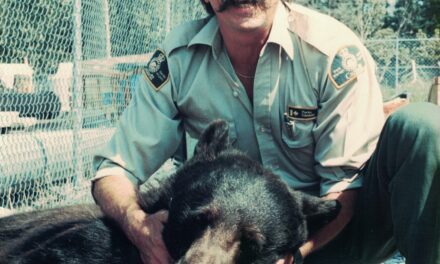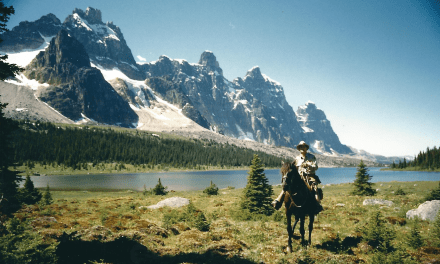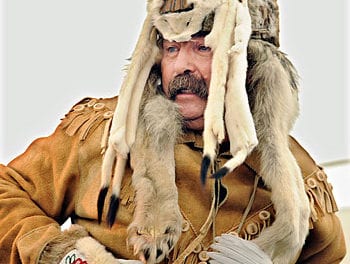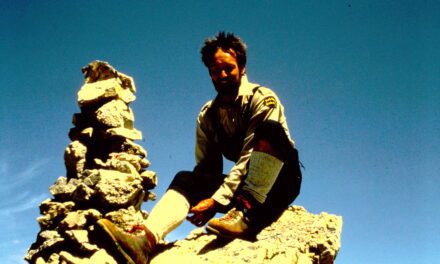SH: How did the Warden Service change over the years? Centralization, affirmative action, changes in 1990s and 2000s.
Ed: That is a big one. I remember when I started, and I was kind of insulated when I was in Rogers Pass. I think a lot of the changes that were being felt from the Syme Schuller report in the late 60s, and the centralization I guess as it was called, that was more felt in places like Banff, and Jasper, Yoho and Kootenay. I didn’t really feel it at the time in the ‘70s when I was in Glacier National Park. When I finally did get to Jasper, you could still feel some of the….I don’t know if I’d say resentment but the change. There were a lot of the older guys that were still around. I always think of one guy, Norm Woody who was sort of the bear guy in Jasper before Wes Bradford. Wes Bradford used to work with him. I always just remember it was probably a huge change for them.
And the Bob Barkers, where they used to live in the backcountry. But when you think of the change that happened subsequent to that. I mean it really is mindboggling. I’m not talking just about the arming issue, but the level of professionalism, that the Warden Service and its members have achieved in public safety starting in the late ‘60s. People being ACMG (Association of Canadian Mountain Guides) guides being well respected by other organizations around them. The fact that we moved towards specialization, in all of our science fields … in our aquatics, our wildlife management, and some of the research that’s been done by many of the wardens. Mike Gibeau and his work, Cliff White and all his work, the re-introduction of bison, the fire history, guys like Rick Kubian who worked on their masters, and Alan Dibb who did work on sheep for his Masters.
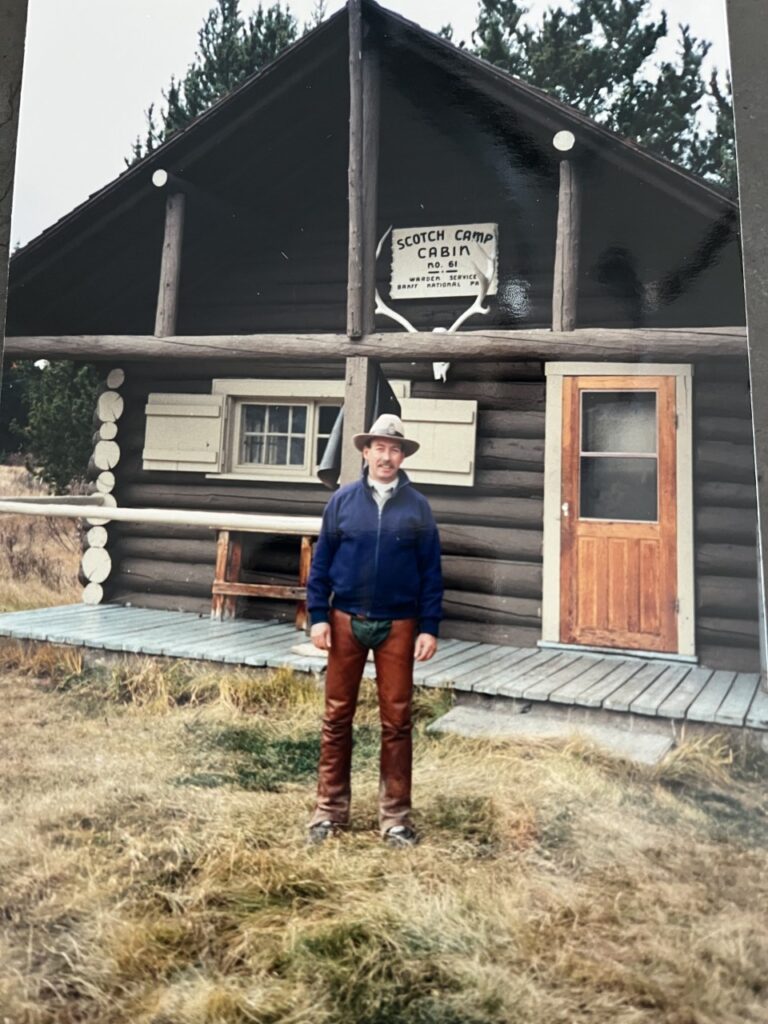
Ed Abbott at Scotch Camp.
The changes of our professionalism as an organization is astounding in a matter of thirty years. Just the fact that we moved even to computerization and cellular phones. Nobody even knew what those were. Some of this affected all of society but when you see the change from when I started in Parks in the ‘70s to when I left in 2008, it’s mind boggling.
There were people that when centralization happened said that the Warden Service will never be the same, it will never be as good as it was.
I think when I was leaving, I’m thinking, how the Warden Service is changed. The wardens are not part of Resource Conservation, they are separated because they have their sidearms. It will never be the same. But you know what? It will be just as good. The people that are in the jobs now will love their job probably just as much as any of us ever did. I think all of us that were there from the ‘70s all the way through to the early 2000’s should be proud of what has been achieved and the professionalism of the Warden Service and Parks Canada, and other departments as well. I speak of the Warden Service, but other departments have moved forward as well. I think when people retire in another ten years, they are probably going to say, “What a great job I had, what a great career.” I know I feel that way after my leaving. It changes, generational.
SH: Good answer. What about the Warden Service was important to you? Preservation, protection, keeping people safe, etc.?
Ed: What was important to me. I think the thing that I liked the most and I said that I would miss the most when I left ..the comradery. I think when I started the job, the stories that I used to hear from Ron Hamilton and then finally getting out here and then working with people and hearing the stories through their careers, you just go “Wow”. I think we even had t-shirts made …”I can’t believe I get paid to do this.” But as you get into the job more and you mature, and you understand more of what’s important. Probably more towards my Chiefs jobs but you start to realize how important these big ecosystems, and these big pieces of real estate are. How critical they are to our health as people and how critical they are to the variety of wildlife, and everything that’s within them and how important it is. I think now you see how fast things are disappearing and how much more critical the protection of these national places are to, not just to us as people who worked there, not just to Canadians, but because of their designation as World Heritage Sites, how important they are to the whole world. The classic one is when I started in Rogers Pass in the ‘70s, we used to have one of the largest concentrations of bears anywhere, and we were surrounded by wilderness.
Now if you look at a park like Glacier and Revelstoke, now they are not. They are the wilderness. They’re the last piece of untracked, unlogged, unmined pieces of terrain left there, and all the road access. It’s just such a huge change in one lifetime, and I think all the parks have become like that. They are now the islands, and before they were the islands of visitor experience. They were for people to coming to enjoy the mountains surrounded by bush. Now they are the islands of their ecosystems. They are the last remnants of what used to be. That’s a huge change.
SH: Great answer Ed. Are there any legends or stories associated with the Warden Service that you can share? Is there anyone in the Warden Service that stands out in your mind?
Ed: No, I don’t really have any legends or stories other than the ones I already talked about that involved just me in them. You think about all the people who have gone before you. No legends or stories. It would have been … I would like to see some other people … You were talking about who else to be interviewed. I didn’t look at the list, but people like Rick Kubian who retired just a year ago. He probably has some good insights into the way things changed, and Bill Hunt. They’re two guys who have been in other parks as well. But in terms of legends and stories associated with the Warden Service, that I can share … No, I don’t really have any and I saw the other guys and gals who put in lots of stuff in there interviews about that.
SH: Is there anything about the Warden Service, as you knew it, that you would want future generations to know?
Ed: I think the one thing that future generations need to know is that they’re part of a long legacy. The Warden Service has been around for over a hundred years now, I guess. It was about a hundred in 2009 at the reunion, so it’s been around a long time, and I think every generation should look, because they have big shoes to fill from the past and they may be different shoes. They were cowboy boots in the early part, and then they became climbing shoes. It’s a great job and hopefully people join it for the same excitement as what people like I did, and other people of my era. I never thought I’d be talking about me being in an era.
SH: Sad isn’t it. (Laughs)
Ed: When you do stuff like this you do get to reflect on where you’ve been a lot. Lasting memories of being a park warden? Just the people. That was nice.
Favourite park? I’d have to say Jasper just because I did almost half of my career in Jasper, leaving and coming back and leaving and coming back.
Favourite cabin? I’d say I really liked Isaac Creek in the Brazeau District, sort of right on the fringe of the foothills. The Brazeau Cabin too was kind of a special place when you ride up and you can see it. I’ve been back to it on a hike a few years ago. It was kind of sad to see it kind of boarded up, and not being used anymore. Fish Lakes in Banff. I did a few trips up to Fish Lakes in that area, and just getting up through the North and South Molar Passes, that’s pretty nice. In terms of one sort of long trip that you could do, a multi day trip, I would have to say the Rockwall through Kootenay is very spectacular and I’ve done it on foot and I’ve done it on horse. It’s pretty spectacular. But they’re all spectacular. I’m just picking out the ones that I’ve been to.
SH: A lot of people have told me their favourite cabin was the one up at Maligne Lake.
Ed: Yes, it was. If you were to get up in the morning and go outside and you look at it … you’ve got the mountains, and this big beautiful mountain lake. You’re up here by yourself, and it’s very quiet in the fall when the businesses have shut down, you do feel pretty blessed to be able to live there. I never saw it as a cabin, I saw it as my home. After I moved out, they gutted it and made it really nice inside, made it all modern and really well insulated. I think Ivan Phillips moved in after I left.
SH: Do you want to talk about humourous stories?
Ed: I don’t really have too many humourous stories that I can recall. I don’t really have any.
I know that you’ll ask “Do you ever miss being a Warden?” No. I miss the people part and I live down in the Okanagan, so I sort of live what I hear through the alumni and if I go back to Jasper, I try to touch base with some people like Mike Dillon or Mike Eder or any of the guys that might be around. I touched base with Reg Bunyan this past Christmas in Banff. But do I miss it … no. But maybe because I don’t miss the last seven years of being a manager, which was pretty tumultuous times with the arming issue. When I left in 2008, I was ready to leave.).
SH: What year did you retire Ed? What do you enjoy doing in retirement?
Ed: I retired in January of 2008. I had bought my house in Kelowna in 2007 and so I was … I kind of lived off some other folks, at their empty condos in Canmore for the last eight months of my career.
One of the things I wanted to do when I did retire was I wanted to buy a trailer so I could travel around and see things, so I did that. I still have it and I still go around and see some of the national parks here in the west throughout the summertime and visit friends. I traveled quite a bit around through western Canada, and down into western United States with it, but I’m not a world traveler so I stay pretty much close to home. I like things like gardening and looking after my place.
SH: Are you still fishing?
Ed: I used to fish and then I kind of fell off of it, but when I got back into my retirement, I started a little more into fly fishing. I have everything I need to go fly fishing and there’s lots of lakes here that are stocked with rainbow trout. I try to get out throughout the summer, but when you have a house there’s always something you need to be doing. We try to go away at least once a month with the trailer for a week at a time. Usually in the fall, with the exception of Covid of course, which kind of curtailed a lot of people’s activities, we would try to go away for a traveling trip through the United States because they’re usually the only places that have campgrounds open through September and October so we try to get out for three of four weeks and do that. And of course, I still have family. I still have four sisters that live in Ontario and my oldest sister is 80 so I try and get back and visit my family.
SH: Hopefully you’ll come through here sometime. It would be great to see you.
Ed: Usually one of our trips in the summer we come down to Red Streak campground in Kootenay. We book in Red Streak and we stay usually three or four nights, but to tell you the truth Sue I didn’t even know you were living in Invermere.
SH: Is there anything I haven’t asked you that you think I should know about the Warden Service?
Ed: I don’t think so Sue. I actually put a lot of time in going through my memory banks and I’m glad to see that I was actually in a position to parse it down a bit from what I had written because I was even beginning to bore myself. (Laughs). No it’s good to do things like this because sometimes you don’t ever reflect back with as much detail. So when you get to reflect back and see….when you asked how many different jobs and how many different places, I’ve worked and all the little steps I had to take to get to essentially what I consider my first warden job, in 1981 when I went to Jasper. I made it to the big leagues sort of thing. But all those little steps that were in Rogers Pass …. It took me quite a few years to get there. And I don’t know if you’re still recording but you’re absolutely right….you made this very un-painful.
SH: Thanks for doing this Ed. I’m turning off the tape now.
Susan Hairsine worked for Resource Conservation and Operations in Mt. Revelstoke/Glacier, Jasper, and Banff National Parks, as well as for Public Safety in Western and Northern Region for over 30 years. She obtained funding for an oral history of Parks Canada’s avalanche personnel and oversaw the successful completion of the project. Her experience working with several of the interviewees during their careers has been an asset to the current project. She was also the Executive Assistant to the Chief Park Wardens of Jasper and Banff National Parks.
